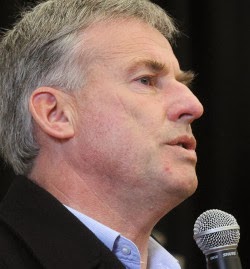In a surprising piece of media theatre a few days ago, senator Richard Colbeck of the Liberal Party and the parliamentary secretary for agriculture, voiced an idea to ban consumer boycotts by activists. As the Guardian reported:
The Libs seems to be following a pattern of muting debate. First it was the non-announcement of the arrival of asylum-seeker boats out of concern such announcements serve the interests of "people smugglers" (a point of view that was roundly trashed in the Sydney Morning Herald a couple of days ago in a story which included an interview with a man in custody in Indonesia, where he had been charged with illegally helping people to go to Australia by boat). Then there was the information yesterday that Liberal and Nationals MPs must clear media appearances with the PM's office before going ahead. This is what Tony Abbott's "calm, methodical" approach to government really means: don't talk and stay away from the 24-hour media cycle.
(I even heard Abbott's sister, a Liberal Sydney City councillor, on TV voicing approval of "staying out of the 24-hour media cycle" yesterday. What do politicians hate about the media so much? Don't politicians understand they have a responsibility to account for their actions to the electorate?)
Then there's Colbeck upset that elements in the electorate are telling people to eat only free-range pork and make sure they check the credentials of retailers pushing "free-range" eggs. Again, it's "don't talk, just let us get on with exercising our mandate". Colbeck's hugely ideological ("values", Tony?) point of view comes under the same banner of silencing unwanted and adverse debate in the public sphere.
Of course it cannot work. Australians have a constitutional right to political speech. All it would take is a question in Parliament on a specific issue and then anyone would be free to use their social networks to call for whatever action they felt was suitable in the case. You cannot realistically muzzle speech by millions of concerned Australians. As we saw in the case of Alan Jones about a year ago, people will react when aroused by clear abuses and the new media environment facilitates their efforts. To ban consumer boycott's you'd need to overturn the 1992 High Court decision of the "implied freedom" of political speech, and there's just no way on God's earth that that's going to happen. So my advice to Colbeck is to suck it up and make sure that corporations and other businesses get in line with consumer expectations about good citizenship. You can't turn back the clock.
Unlawful secondary boycotts occur if third parties deliberately hinder the supply of goods or services – but there is an explicit exemption for activists involved in campaigns intended to protect the environment or consumers.Farmers are often vocal about the power of activist groups - I watch them grumble on social media, as they do from time to time - so it's not too surprising to hear Colbeck (pictured) get behind what he might consider his constituency. But farmers are also very vocal about their own interests and I have often heard for bans of the retail duopoly - Coles and Woolworths - when things go against farmers' economic interests and they see an opportunity to use activism to promote them.
The Libs seems to be following a pattern of muting debate. First it was the non-announcement of the arrival of asylum-seeker boats out of concern such announcements serve the interests of "people smugglers" (a point of view that was roundly trashed in the Sydney Morning Herald a couple of days ago in a story which included an interview with a man in custody in Indonesia, where he had been charged with illegally helping people to go to Australia by boat). Then there was the information yesterday that Liberal and Nationals MPs must clear media appearances with the PM's office before going ahead. This is what Tony Abbott's "calm, methodical" approach to government really means: don't talk and stay away from the 24-hour media cycle.
(I even heard Abbott's sister, a Liberal Sydney City councillor, on TV voicing approval of "staying out of the 24-hour media cycle" yesterday. What do politicians hate about the media so much? Don't politicians understand they have a responsibility to account for their actions to the electorate?)
Then there's Colbeck upset that elements in the electorate are telling people to eat only free-range pork and make sure they check the credentials of retailers pushing "free-range" eggs. Again, it's "don't talk, just let us get on with exercising our mandate". Colbeck's hugely ideological ("values", Tony?) point of view comes under the same banner of silencing unwanted and adverse debate in the public sphere.
Of course it cannot work. Australians have a constitutional right to political speech. All it would take is a question in Parliament on a specific issue and then anyone would be free to use their social networks to call for whatever action they felt was suitable in the case. You cannot realistically muzzle speech by millions of concerned Australians. As we saw in the case of Alan Jones about a year ago, people will react when aroused by clear abuses and the new media environment facilitates their efforts. To ban consumer boycott's you'd need to overturn the 1992 High Court decision of the "implied freedom" of political speech, and there's just no way on God's earth that that's going to happen. So my advice to Colbeck is to suck it up and make sure that corporations and other businesses get in line with consumer expectations about good citizenship. You can't turn back the clock.

No comments:
Post a Comment